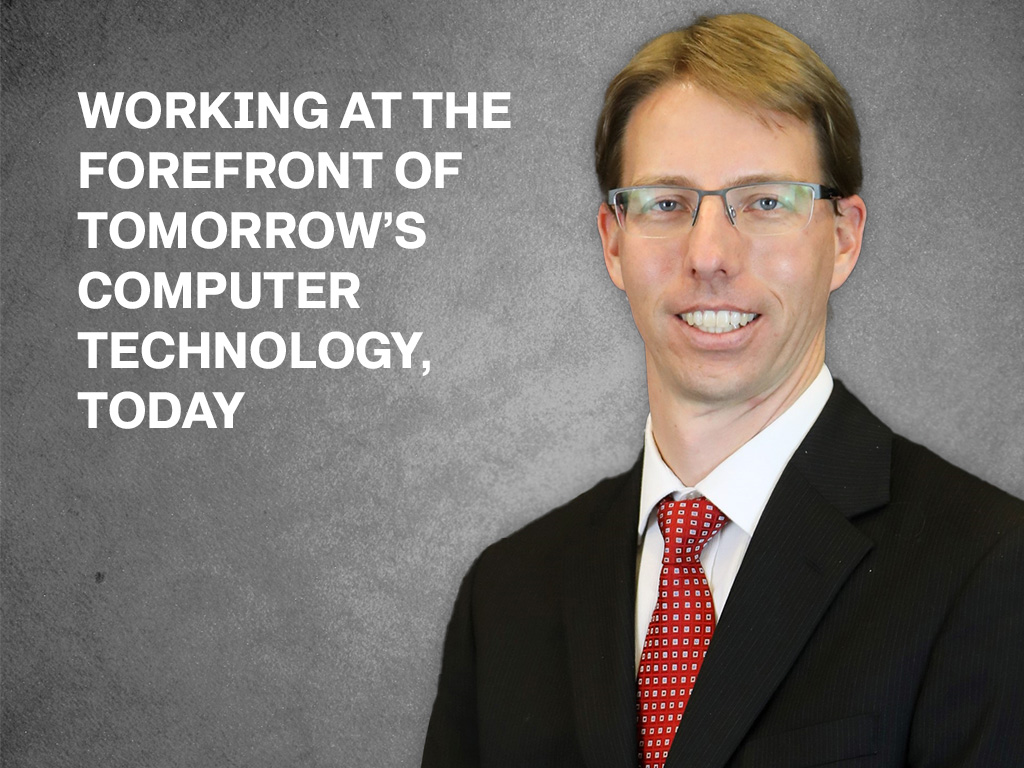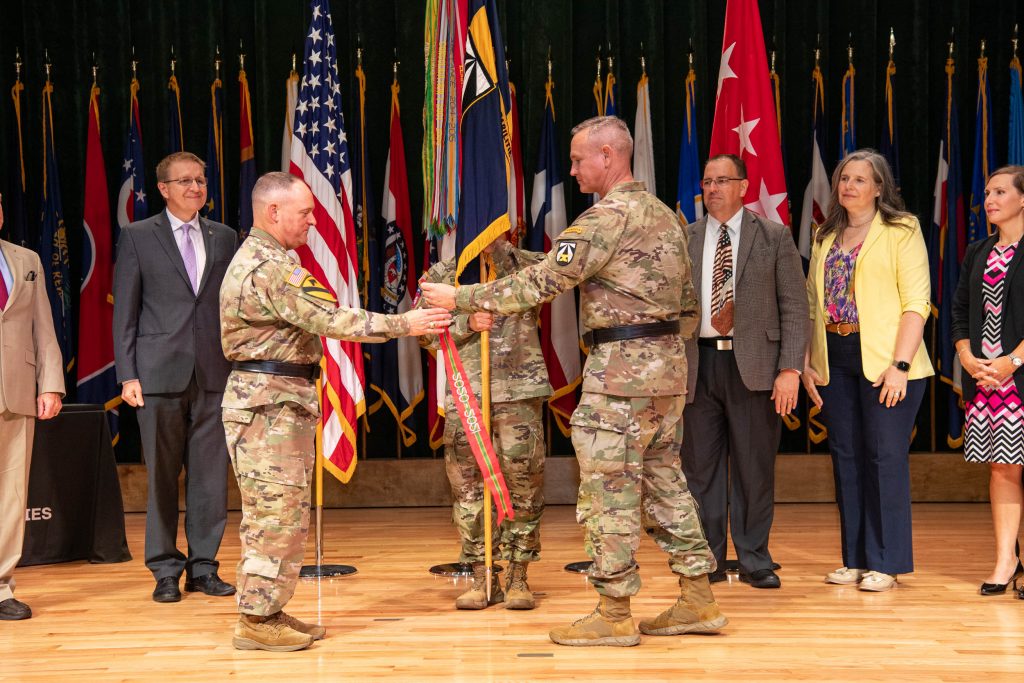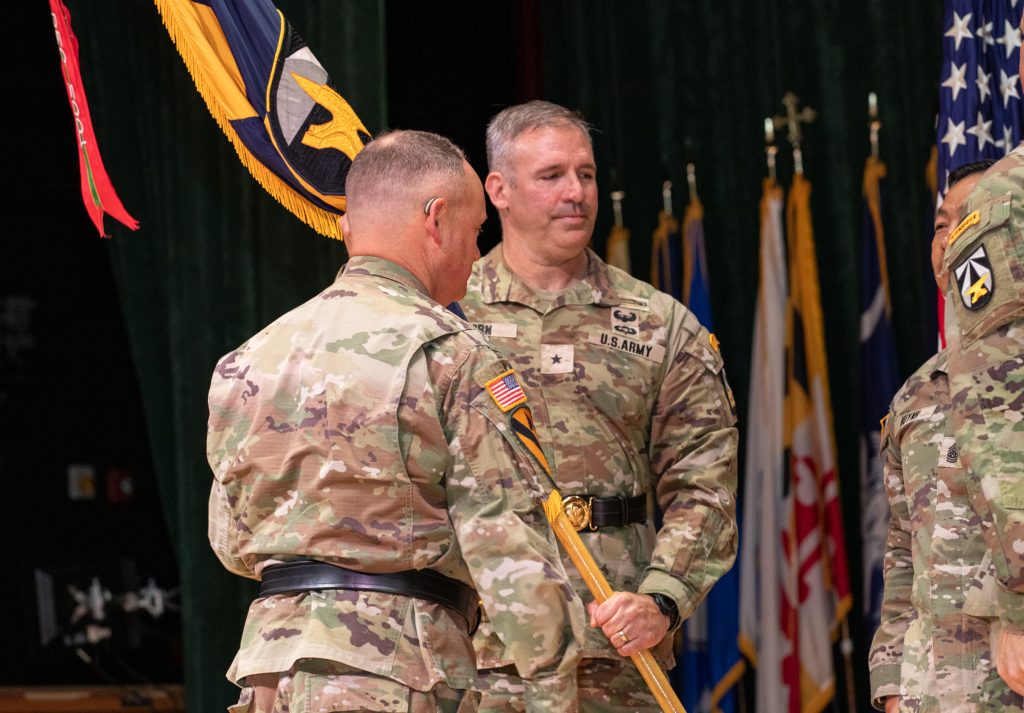Working at the forefront of tomorrow’s computer technology, today
August 14, 2024By Ryan Rayno, DEVCOM Public Affairs
“Both of my parents were computer programmers, so I was exposed to computer science from a young age,” David Arty, a branch chief for U.S. Army Combat Capabilities Development Command, or DEVCOM, U.S. Army Combat Capabilities Development Command, or DEVCOM, Command, Control, Communications, Computers, Cyber, Intelligence Surveillance and Reconnaissance Center, or DEVCOM C5ISR Center, said. “I became interested in learning the process of putting things together and making them do interesting new things.”
Arty’s parents started bringing computers home in the late 1980s, allowing him to experiment with early generation machines at a time much earlier than others in his neighborhood.
“This was the time of luggable computers, and we were one of the first houses to have computers to tinker with,” he said. “Once friends of mine started getting computers in the early 2000s, I was able to show them things that I had learned over time.”
After graduating high school, Arty earned his Bachelor of Arts in Computer Science and Chemistry from Cornell University and a Master of Science in Software Engineering from Monmouth University.
“Right after I graduated from Cornell, I started at Monmouth and came into a group there that was learning cybersecurity,” he said. “I didn’t have any significant cybersecurity schooling, but I was able to learn it with the help of my CS background. I decided to stay in the cybersecurity field because it’s an interesting and constantly changing area.”
Arty was able to leverage his interest in computer science and cybersecurity into a new career at DEVCOM C5ISR Center, then known as the Communications-Electronics Research Development and Engineering Center, in 2004.
Working at DEVCOM C5ISR Center has given Arty the ability to work with emerging technologies and equipment much earlier than others, just like he had the opportunity to do so growing up.
“As a science and technology organization, we are able to see what’s being developed in real time and how cyber affects it all,” Arty said. “From very early in my career, I was able to test computer systems that were in ground vehicles and test systems software going into aircraft. It’s allowed me to put real-world context and perspective in supporting Soldiers, and that’s been very rewarding.”
“As a science and technology organization, we are able to see what’s being developed in real time and how cyber affects it all,” Arty said. “From very early in my career, I was able to test computer systems that were in ground vehicles and test systems software going into aircraft. It’s allowed me to put real-world context and perspective in supporting Soldiers, and that’s been very rewarding.”
Arty also credits DEVCOM C5ISR Center for the opportunity to continue his professional growth throughout his now 20-year career.
“Training and education are encouraged and easily approved in terms of learning specific domain knowledge and having the constant ability to see new topics,” he said. “I started my career working on risk management, which focused on security on platforms and networks, but I’ve had the opportunity to add software assurance, which is working on applications that are running on platforms and networks. It’s been really interesting.”
Those opportunities to work with new technologies while expanding his expertise is what equips Arty to best combat real-time advancements from threats.
“Threats continue to evolve and the techniques and technologies that we encounter are going to continue to grow,” Arty said. “Some of these ways will be unpredictable, and we will need to continue to learn how to use new tools; DEVCOM C5ISR Center has been very helpful to me with that in terms of helping with cybersecurity certifications to augment my computer science background.”
“Threats continue to evolve and the techniques and technologies that we encounter are going to continue to grow,” Arty said. “Some of these ways will be unpredictable, and we will need to continue to learn how to use new tools; DEVCOM C5ISR Center has been very helpful to me with that in terms of helping with cybersecurity certifications to augment my computer science background.”
Just as much as he’s appreciated the support in his self-development, he’s been especially happy to see that support extended to his team for their development as well.
“To see everybody learn how to use new tools themselves and support new systems has been very rewarding to see,” he said. “They grow professionally and help the branch grow as they advance in their careers. We’ll see a lot of new emerging things that bring very interesting ideas in the next decade or so because our leadership makes it really easy to get what we need.”
—
The U.S. Army Combat Capabilities Development Command, known as DEVCOM, is Army Futures Command’s leader and integrator within a global ecosystem of scientific exploration and technological innovation. DEVCOM expertise spans eight major competency areas to provide integrated research, development, analysis and engineering support to the Army and DOD. From rockets to robots, drones to dozers, and aviation to artillery, DEVCOM innovation is at the core of the combat capabilities American Warfighters need to win on the battlefield of the future. For more information, visit devcom.army.mil.



